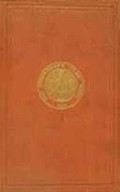Abstract
The Liberian Republic had its origin in the efforts of several colonisation societies of Europe and America to make permanent provision for freed American slaves. In 1822 a settlement was formed on the west coast of Africa near the spot where Monrovia now stands. On July 26, 1847, the State was constituted as the Free and Independent Republic of Liberia. The now State was first recognised by Great Britain, and ultimately by other Powers. The Constitution of the Republic is on the model of that of the United States, with trifling exceptions. The executive is vested in a President, a Vice-President, and a Council of 6 Ministers, and the legislative power in a parliament of two houses, called the Senate and the House of Representatives. The President and the House of Representatives are elected for four years, and the Senate for six years. The President must be thirty-five years of age, and have real property to the value of 600 dollars, or 120l. Electors must be of negro blood, and owners of land. The natives of the country are not excluded from the franchise, but, except in the centres of civilisation, they take no part in political life. The official language of the Government is English.
Access this chapter
Tax calculation will be finalised at checkout
Purchases are for personal use only
Preview
Unable to display preview. Download preview PDF.
Statistical and other Books of Reference concerning Liberia
1. Official Publications
Report of U.S. Commissioner of Education for 1905. Vol. I. contains a Report on Education in Liberia by G. W. Ellis, secretary of the U.S. Legation at Monrovia. Washington, D. C., 1907.
Foreign Office Report on the Trade of Liberia. London.
2. Non-Official Publications
Blyden (E. W.), Christianity, Islam, and the Negro Race. London, 1887.—A Chapter in the History of Liberia. Freetown, 1892.
Bourzeix (Père P.), La République de Liberia. Paris, 1887.
Buttikofer (J.), Reisebilder aus Liberia. 2 Bde. Leiden, 1890.
Delafosse (M.), Un État Nègre: La République de Libéria. No. 9 of ‘Renseignements Coloniaux.’ Paris, 1900.
Johnston (Sir H. H.), Liberia: The Negro Republic in West Africa. London, 1906.
Reports of Council of the Corporation of Foreign Bondholders. London.
Wallis (Captain C. Braithwaite), The Advance of Our West African Empire. London, 1903. And articles in the Geographical Journal.
Wauwermans (Colonel H.), Liberia, histoire de la fondation d’un état nègre libre, Brussels, 1885.
Editor information
Copyright information
© 1919 Palgrave Macmillan, a division of Macmillan Publishers Limited
About this chapter
Cite this chapter
Scott Keltie, J., Epstein, M. (1919). Liberia. In: Scott Keltie, J., Epstein, M. (eds) The Statesman’s Year-Book. The Statesman’s Yearbook. Palgrave Macmillan, London. https://doi.org/10.1057/9780230270480_38
Download citation
DOI: https://doi.org/10.1057/9780230270480_38
Publisher Name: Palgrave Macmillan, London
Online ISBN: 978-0-230-27048-0
eBook Packages: Palgrave Political & Intern. Studies CollectionPolitical Science and International Studies (R0)

